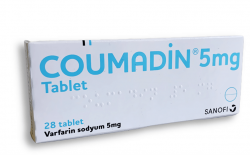Coumadin (warfarin) Coupons, Discounts & Cost
Coumadin (warfarin) is a preparation prescribed for the prevention of blockages in the blood vessels and treatment of thrombosis. One way to save money on the Coumadin (warfarin) retail cost regardless of income and insurance status is to use Coumadin (warfarin) coupons or discount cards from RXCoupons. Use our Coumadin (warfarin) coupons at your online pharmacy and receive up to 75% off the sale price each time you refill your prescription.
What is Coumadin (warfarin)?
Coumadin (warfarin) is a preparation prescribed for the prevention of blockages in the blood vessels and treatment of thrombosis. The drug reduces the formation of blood clots.
Coumadin is used to prevent heart attacks, strokes, blood clots in the veins and arteries. The drug can also be used for other purposes not listed above.
When should I use Coumadin (warfarin)?
Coumadin (warfarin) is effective in the following cases: - Treatment and prevention of thrombosis (acute venous thrombosis and pulmonary embolism); - Postoperative thrombosis; - Recurrent myocardial infarction; - Recurrent venous thromboembolism; - Recurrent pulmonary embolism; - In combination with other drugs during thrombolytic therapy or surgical thrombosis.
How to take Coumadin (warfarin)?
Follow the instructions. Do not take this medication in larger or smaller amounts or longer than recommended. Never take a double dose of the drug.
Take Coumadin at the same time each day. The tablets can be taken with or without food.
Tell your doctor if your body weight changes for any reason during treatment.
Call your doctor if you have diarrhea, fever, chills, pain, flu-like symptoms.
Store the drug at room temperature, away from heat, moisture, and light.
Coumadin (warfarin) contraindications
Coumadin (warfarin) is contraindicated in the following cases: hypersensitivity, severe bleeding, severe liver or kidney disease, severe hypertension, hemorrhagic diathesis, thrombocytopenia, gastric and duodenal ulcers, renal failure, brain hemorrhage, alcoholism, pregnancy.
Coumadin (warfarin) side effects
Coumadin (warfarin) may cause the following side effects: hemorrhage, diarrhea, eczema, warfarin-induced skin necrosis, vasculitis, hair loss.
Seek medical help if you have signs of an allergic reaction to warfarin (redness, shortness of breath, swelling of the face, lips, tongue, or throat).
Stop using warfarin and immediately contact your doctor if you have serious side effects such as: - Severe pain in the leg, swelling, fever, foot ulcers, sudden headache, dizziness, or weakness; - Unusual bleeding, prolonged bleeding; - Strange red spots on the skin; - Blood in the urine, bloody stools, vomiting; - Dark urine, jaundice; - Pain in the stomach; - Diarrhea, fever, flu-like symptoms.
This is not a complete list of side effects of Coumadin. Call your doctor for medical advice.
Coumadin (warfarin) overdose
Coumadin (warfarin) overdose symptoms: bleeding. It is necessary to reduce the dose or stop treatment for a short period of time.
Coumadin (warfarin) interaction
NSAIDs, dipyridamole, valproic acid, cimetidine and chloramphenicol increase the risk of bleeding.
Barbiturates, vitamin K, dicloxacillin, carbamazepine, mianserin, paracetamol, retinoids, rifampicin, phenazone, cholestyramine may reduce the level of the drug in the blood.
Laxatives can increase the risk of bleeding (due to a decrease of normal coagulation).
Consult with your doctor before taking any medication that is used to treat arthritis or swelling. These include acetaminophen, aspirin, ibuprofen, diclofenac, indomethacin, naproxen, and others. These medicines can affect blood clotting and increase the risk of stomach bleeding.
Reduce the amount of vitamin K in your diet (avoid green leafy vegetables and vegetable oils). Avoid any changes in your diet without first consulting with your doctor.
Coumadin (warfarin) special instructions
Coumadin (warfarin) should not be prescribed to pregnant women (due to the possible risk of bleeding in the fetus and fetal death).
Warfarin has no effect on blood clotting in infants. Thus, the drug can be used during lactation.
During the period of treatment, patients should refrain from alcohol consumption (due to the risk of hypoprothrombinemia and bleeding).

